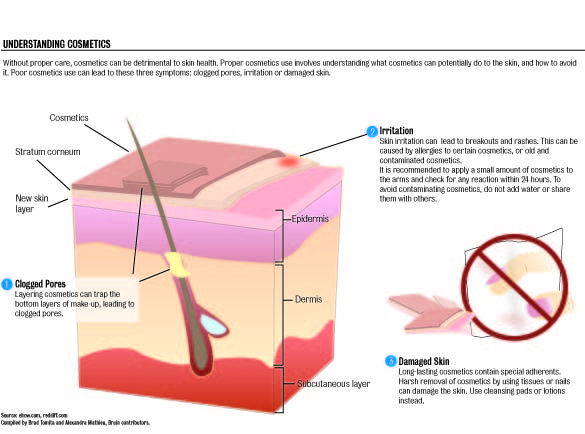The science of cosmetics

By Alexandra Mathieu
May 4, 2010 10:14 p.m.
For cosmetics enthusiast Alyssa Perez, applying, sharing and experimenting with different cosmetics colors and brands is a hobby.
“It is not necessarily part of my identity, but it is fun,” said Perez, a second-year mathematics/economics student.
Perez, who explained that acne runs in her family, said she believes the skin problems she faces are not attributed to her daily use of cosmetics.
Cosmetics cover up the skin imperfections everybody feels a little uncomfortable with, Perez added.
Skin health is influenced by genetic factors like inheritance of acne and by environmental factors like sun exposure, said Dr. Jenny Kim, a dermatologist and associate professor of clinical medicine.
The use of cosmetics can have a neutral effect on acne and actually make the skin better, Kim said.
Most cosmetics today accommodate patient skin sensitivity and proneness to acne, said Dr. Patrick Lee, an associate clinical professor at the UCLA David Geffen School of Medicine.
However, recent UCLA research has suggested that cosmetics containing nanoparticles may pose health concerns other than skin problems for cosmetics users. Data from a study at the UCLA Jonsson Comprehensive Cancer Center conducted by Robert Schiestl, a professor of pathology, radiation oncology and environmental health science, suggested that nanoparticles can be detrimental to a person’s health.
The study’s researchers found that titanium dioxide nanoparticles, found in cosmetics and also many household products, caused inflammation and damage in genes and chromosomes of mice when the particles were ingested at high doses, said Benedicte Trouiller, the first author of the study and former researcher at the UCLA School of Public Health.
There is no knowledge about how the body gets rid of nanoparticles in household products and cosmetics, meaning that they could accumulate and cause health problems, she added. Compared to the control group of untested mice offspring, the offspring of mice that ingested titanium dioxide inherited DNA damage.
Nanotechnology research has enabled particles to become smaller, said Michael Kolodney, a dermatologist and associate professor of medicine. The use of nanoparticles in consumer products remains controversial because it is unknown whether these particles can be absorbed beyond the stratum corneum, which is a dead layer of skin, and beyond the epidermis, the outermost skin layer, Kolodney added.
The Food and Drug Administration recently published a study in the Journal of Toxicological Sciences that suggests nanoparticles do not penetrate the epidermis. However, because nanoparticles can be as small as one hundredth of a nanometer, they may be able to breach the skin barrier, Trouiller said.
For example, zinc and titanium particles can benefit from becoming smaller for use in products like sunscreen. Smaller particles can improve the consistency and appearance of sunscreen, Kolodney said.
There are no cosmetics that make acne worse, unless they clog the pores or irritate the skin and cause inflammation, Kim said. Both genetics and age have considerable effects on skin health. Teenagers’ oil glands have higher levels of oil secretion, and the bacteria on the skin’s growth are greater, Kim said.
Mineral-based cosmetics use natural earth minerals, like zinc, and are favorable to people with oily skin, Kim said. The thicker and oilier the applied cosmetics are, the more likely pores will be clogged, she added.
Antioxidants like vitamins A, C and E are often found in cosmetics and they have been shown to reduce and even reverse photoaging, or skin aging due to sun exposure, Kim said.
The different ingredients and preservatives in cosmetics can degrade into different compounds over time, making it necessary for people with sensitive skin to discard makeup older than six months, Lee said.
Skin health is a result of good hygiene, Kim said.
“Skin is the most important organ of the body and the first thing anybody notices about you,” Kim added.


